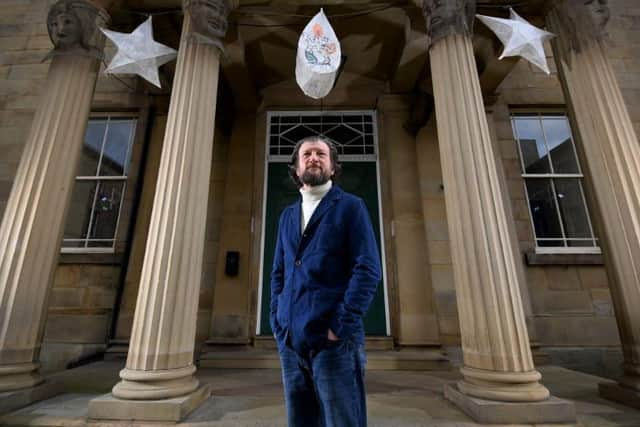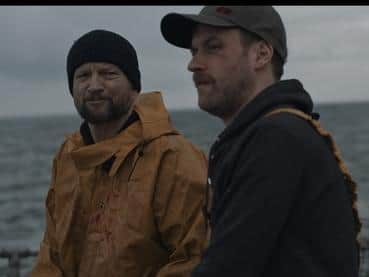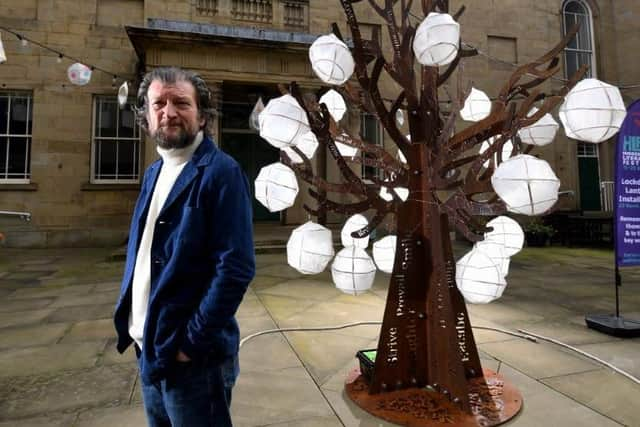Yorkshire actor Liam Thomas releases Scarborough-based short film inspired by late brother after roles in Ammonite and Damned United
Submariner, undercover police officer, actor and writer: Liam Thomas has gone around the houses somewhat in his pursuit of a dream career.
Raised in Fleetwood – he now lives near Huddersfield – he left aged 17 for a four-year stint in the Navy, but has been performing for around 15 years and has won roles in Yorkshire director Francis Lee’s God’s Own Country, latest success Ammonite, and before that as Leeds footballer Les Cocker in The Damned United.
Advertisement
Hide AdAdvertisement
Hide AdThomas has now released his own short film, The Tide, one that is inspired by his roots and the death of his younger brother 10 years ago.


Neil, a fisherman, was in his 40s when he took his own life.
A story he told Thomas about an ailing trawler during one of their last meetings stuck with him, and he developed the premise for the new Scarborough-based film, one which explores the implications for those struggling in such industries.
He said: “We met, funnily enough, in what had been once upon a time a thriving kind of fisherman’s pub, I guess.
Advertisement
Hide AdAdvertisement
Hide Ad“And he just told me the story of an otter board coming loose in a storm. And he was like a lot of guys you imagine this kind of stamp... He was a man of few words, but this was such a beautiful story that he told me...


“It was just a lovely moment” he adds. “Then I was blindsided, a few weeks later, when he was gone.”
He continues: “When you’re hit with this kind of tragedy you re-run all the last conversations, but this kind of stayed with me, and I suppose I had an idea to do something with it.”
Thomas himself plays Jimmy, a fisherman working alongside the skipper, played by Francis Magee of Game of Thrones fame, as they comes to terms with future at sea. The film, directed by Dan Hartley, recently debuted at the (online) Manchester Film Festival but Thomas hopes to revisit the concept and its themes of industrial decline, working class masculinity and male mental health with a feature film.
Advertisement
Hide AdAdvertisement
Hide AdIt comes as latest figures for suicides are grim reading, particularly in regard to men: the Office for National Statistics (ONS) revealed last September that such deaths among males in 2019 remained at a two-decade high – 16.9 deaths per 100,000 in England and Wales.


Men accounted for about three-quarters of suicides registered that year – 4,303 – said the ONS.
In 2018, the highest suicide rates in the UK was among men aged 45 to 49, according to the Samaritans.
The organisation stresses that suicide is preventable, but “complex and it is rarely caused by one thing”. Its previous research showed that men from disadvantaged backgrounds in their 30s, 40s, and 50s were at highest risk of dying by suicide because of various issues.
Advertisement
Hide AdAdvertisement
Hide AdThese included: their background; personality traits; masculinity and men comparing themselves against a masculine “gold standard”; relationship breakdowns; challenges of mid-life; socio-economic factors; and “emotional illiteracy” – “many men across all social classes are reluctant to talk about emotions”.
This corresponds with Thomas’s own view that, despite a general increase in awareness about mental health problems, some men still find it difficult to confide about their struggles.
“There can be a perceived stigma around masculinity and mental health in particular amongst...working class men,” he says.
“The difficulty, the sense of it being seen as weakness... It’s shocking in this day and age, I guess is what I’m saying.”
But he thinks this attitude persists.
Advertisement
Hide AdAdvertisement
Hide Ad“[Combating it] takes time and it takes expertise and it does take investment. And yes, I think we’re getting better, but it was too late.
“You know, it was too late to (save) my brother.”
During his work at the cutting edge of policing, Thomas says he did not speak about his problems, nor did colleagues who “then have paid a price”.
The father-of-two also senses a link between mental health issues and the socio-economic decline of certain areas. “You can see that replicated around coastal communities and I think that had a big impact on our kid. His very identity was eroded, in some ways, by the demise of this community but yet the sense was that you have to be strong and being strong meant not communicating and not talking about, you know, problems you might have.”
The boat used in the film, whose real name is Crusader, was bought from salvage, repaired and put to use taking people out on fishing day trips in Scarborough.
Advertisement
Hide AdAdvertisement
Hide AdThomas made the film in the North Yorkshire seaside town because he had been doing some theatre work in the area and had got to know some local fishermen.
A number British films in recent years have explored coastal identity – such as Bait, based in a Cornish fishing village, and Fisherman’s Friends, a more lighthearted romcom – but Thomas thinks there is more to explore. “It’s not something we’ve seen in British filmmaking too much and I think we’ve been missing out on some extraordinary stories,” he says.
People from such communities can relate to stories of the sea.
“If you grow up in that kind of community – Grimsby, Hull, Fleetwood, Scarborough – you may not have set foot on a boat but it’s very likely you will have salt in the blood.”
Advertisement
Hide AdAdvertisement
Hide AdAfter coming out of the Navy, during which he spent time as a submariner, Thomas joined the police and steadily rose through the ranks.
His exploits as an undercover officer infiltrating some of society’s darkest criminal underbellies was the subject of a short Vice documentary in 2017.
He went on to study film history in London before postgraduate training in acting and in 2018 he launched Sleeping Dogs, a theatre company championing northern voices.
So what does it feel like to finally be doing what he really wants?
“Absolute joy,” he says.
Advertisement
Hide AdAdvertisement
Hide Ad“You know, it’s always going to be difficult. I consider myself an extraordinarily lucky man now both in terms of: I’ve met my wife, I have two wonderful children, and I’m getting an opportunity to tell my stories.”
He said that he has met some “extraordinary people” as a day player in the industry who have been supportive, and he wishes to thank the British Film Institute and Film Hub North for their encouragement.
“There’s always a kind of working class sense of the imposter syndrome, you know, and that for a time used to bother me,” he says.
After overcoming that, he decided to listen to those encouraging him and believe in what he was doing.
Advertisement
Hide AdAdvertisement
Hide Ad“And tell your stories, you know, and if it finds an audience, fine,” he says.
“Even if it doesn’t, then that’s equally fine.”
Thomas is in the process of writing a memoir about his varied life and career.
The author weaves the story of his covert surveillance work together with his family history and he book is due out next year.
Thomas’s father had also been a police officer.
He said: “I think it was a attempt to try and get closer to him and to understand him.”
Advertisement
Hide AdAdvertisement
Hide AdThomas also wished to thank the male support group Andys Man Club, which he wishes was around during his own brother’s mental health issues despite his own attempts to help his sibling.
He said: “I remember coming away from meeting them in Halifax and thinking, God, I wish there was this when he was alive.”
The Tide is set to appear at various film festivals and be screened in Scarborough later this year.